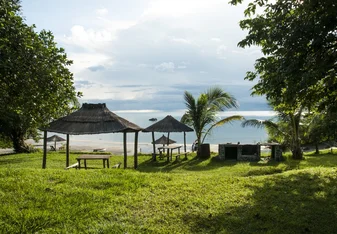Teach English in Namibia
Teaching Programs in Namibia
About
Located in the southwest corner of Africa, Namibia is a vast country of stark deserts, towering mountains, and rural villages looking for intrepid teachers like you. You might find yourself teaching in a small schoolhouse in a remote village or in a modern international school in along the tree-lined boulevards of the country's capital city.
There is a significant shortage of teachers in Namibia, so your skills and enthusiasm as an educator will be greatly appreciated and put to good use. When you're not in the classroom, you can explore the stunning Namib desert, go on a wildlife safari, or lounge on pristine beaches. This is a great destination for teachers looking to stretch their comfort zone and gain an unforgettable educational experience of their own!
Job Types
Public Schools
Most teaching opportunities in Namibia are in government-run schools. These tend to be in rural villages. There is a huge demand for English speaking teachers in these schools and you may find yourself teaching several subjects, such as math, English, science, or art.
Unfortunately, these schools often lack the resources you might be used to back home. They often can’t pay a salary, but will provide you with housing and meals. You might end up living with other teachers in a dorm near the school or with a family. Either way, this is a great way to be immersed in the local culture.
Private Schools
There are about 100 private and international schools in Namibia. Many of these are located in the capital city of Windhoek. Some of the schools follow American or British curricula and they tend to be better funded and supplied than public schools. While not lucrative, these schools do offer a basic salary for their teachers.
Finding a Job
When to Apply for Jobs in Namibia
It is possible to apply for a teaching job in Namibia at any time of the year. However, with the school year starting in January, most positions are advertised a few months before then.
How to Apply for Jobs in Namibia
In order to land your teaching job, you can find job postings on the website of Namibia’s Ministry of Education, Arts, and Culture. You can also apply directly to one of the country’s private schools.
Another popular route is to use one of several organizations that place volunteer teachers in classrooms throughout the country. This is a more convenient option than directly applying, as these groups will help facilitate the hiring process and will place teachers in the areas with the highest need for educators.
Qualifications Needed
Many Namibian teach abroad programs accept teachers with nothing more than a Bachelor’s degree, regardless of the subject it is in. However, it is best if you have at least some prior teaching experience so that you understand the concepts of classroom management and effective instruction.
Need to Know
Popular Destinations to Teach in Namibia
The vast majority of Namibia’s population lives in small villages scattered around the countryside. In one of these villages, you will get to know all the ins and outs of rural Namibian life and build strong bonds with your community. When not in the classroom, you may be living with a local family or in a hostel-like setting with other teachers. These placements offer you the unique opportunity to see a side of the country that few foreigners ever experience.
Alternatively, you may find yourself in the capital city of Windhoek. This city of about 300,000 people is Namibia’s only urban center. Most private and international schools are located in this modern and well-manicured city. Here, you will find many opportunities to experience urban African life, while still having easy access to outdoor adventures that await not far beyond the city.
Visas & Sponsorship
Your first 90 days in Namibia are covered by a simple tourist visa. If you’ll be there for longer, you’ll need to apply for a work visa upon arriving in the country. The process of filing for a work visa may seem cumbersome and complex, but your school or program will help you navigate this process.
Teacher Work Culture in Namibia
If you work in a rural public school, you might be the only international teacher there. Placements are done this way in order to disseminate help throughout the country. Depending on the region and school, there might be a language barrier between you and your Namibian co-workers. However, interactions at work will help to improve the English language skills of your colleagues as well as your students.
Most Namibians speak English as a second language. As such, the English here may be different from the way you naturally speak. Be conscious of how fast you talk. The blank stare you receive from a student or colleague might mean they simply don’t understand you. Slow down, enunciate, avoid idioms, and you will get your point across better.
Classroom Etiquette in Namibia
At rural schools, students will either live in nearby dorms or may walk many miles to reach your classroom. They may not have access to basic supplies. Consider bringing some of your own supplies from your home country, such as books and basic materials, since they may not be available at the school.
You might find that your students don’t open up to you immediately. It is unlikely that they have ever met a foreigner before. Be patient and friendly, which will help break down cultural barriers, and your students will become more and more comfortable in your classroom.
Health & Safety
It is recommended that you get vaccinated for hepatitis A and typhoid before leaving for Namibia. One advantage of Namibia’s arid climate is that most of the country is free from disease-spreading biting insects. The watery northwest of the country is an exception. If you get placed in this region, it is highly recommended that you take anti-malaria medication and protect yourself from mosquitoes and other flying bloodsuckers.
Medical care in rural areas will be very basic, so it's best to stock up on any medications you need before you travel. If you work at a private international school, they might set you up with an insurance plan.
Namibia is a relatively safe destination. Road safety can be an issue though. It’s best to stay off the roads after dark, when accidents are most common due to careless drivers and wandering animals.

















